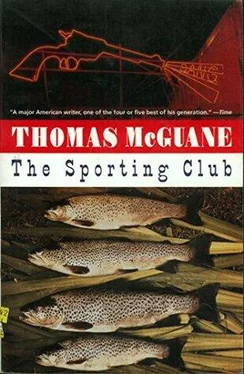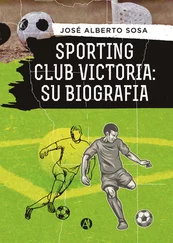With no apologizing, Stanton said, “Lead me to fish.”
“Let’s go,” Olson said shortly. They started down. All three men had flashlights and played them about the path at their feet that sloped down to one end of the woodcock marsh. The duns now seemed to hang in the air like gauze and Quinn continually brushed them away from his face and hair, squinting downward to the small disc of light that skimmed the path in front of him. Stanton hung back until Olson was well in front and whispered to Quinn, “Is Herr Olson impatient with me?”
“ I was impatient with you.”
“Mister Quinn, I never wear my Bug House clothes to the river.” Quinn noticed Stanton’s multi-pocket vest and brush pants in the penumbra of his flashlight. They went on down as the angle of the path’s decline began to flatten out and they could feel the coolness of the low ground rising about their legs. Quinn heard Stanton behind him swear to himself bitterly. In front of them now, the river rattled in its hard bed. “Vernor,” said Olson at the bank, “why don’t you wade up to the rollway pool from here. Stay to this shore and you will have hard gravel all the way. When you can’t hear the river running so hard you’ll know you’re at the pool.”
“I know where the pool is,” Stanton said.
“Okay. What fly have you got on?”
“Let me worry about that. Goodbye. I’ll meet you back here.” Stanton got in the river. The pines at the far side were completely black; the sky above lighter and the river below a sheen, also lighter. Stanton soon disappeared but they could hear him wading, a deeper note than the river made without him. Olson turned to Quinn. His green suit made everything but his face disappear. It seemed to float, rounder because his hair was thinning.
“Why don’t you drop down a ways and fish the off bank back to here,” he said. “You know the river.”
“Fine with me.”
“I’ll fish below the creek outlet.”
“I think you’re giving me the break,” Quinn said.
“Plenty of river for us all. Does Stanton know how to find that pool?”
“I think so.”
“He knows all the answers, doesn’t he?”
“You must make allowances,” Quinn said.
“Shit too,” said Olson. A sample of the talk that brought his name to the fore every year at the Book-Cadillac. “Anyway, catch a fish.”
“I’ll do my best.”
Quinn got in the river and waded to the far bank where he knew the current had deposited enough gravel to leave a safe walking ledge. It was never comfortable wading at night though; he could see the water around his waist shine so that he knew where it was. But the sight of bottom that was so reassuring when wading in fast water was lost. As he waded, he switched out line from the end of his rod, working it gradually into the air. The big wind-resistant night fly was hard to move until he had thirty feet of line up and then it began to carry and hiss as it passed overhead. He began to fish automatically, taking his exercise, thinking. He was just beginning to be able to fish as he wanted to. It would always be a week until he could relax and bear down and fish with exactitude. But the hatch now was passing already. Too bad. Olson would feel responsible. The nighthawks that crossed back and forth above him were disappearing with the duns. Otherwise the spring uproar was at a peak, the forest as raucous as a one-man band. The river here was narrow with stable banks that let the trees grow close. Above his head they left a corridor of stars obscuring with streamers of cloud. Quinn knew Stanton was at the foot of his pool swearing and flogging water, wanting at any cost to come up with the best catch. Stanton was a competitive fisherman; that is, an odious apostate. He tried to beat fish out of the river. When successful, he challenged you with them. Olson who, as a fisherman, was his opposite number, fished deferentially and awaited his occasions. There were none of the streamside brawls between man and fish that grace the covers of the sporting periodicals. Olson had his unique alchemy and fished for sport. He kept only the fish he needed.
The sky had grown heavy and Quinn stopped casting and reeled up. The air seemed dense and he stood where he was and waited in the steady rush of water. The first thunder came and a hot seam of lightning opened across the southwestern sky. He knew it was dangerous to be in the river and he turned to wade back. Grape-size drops of rain started to fall and take the sheen off the river. He was dry only a moment more and then he was soaked through to his underwear. His hair clung to his skull. Unnerving drops ran down from the base of his neck and the sky overhead kept fracturing with livid fissures of light. He had to be careful going downstream. The tendency to trip on obstructions was increased with the current behind. When he could see Olson silhouetted on the far bank, he crossed over. Olson gave him a hand and he clambered up. They sat down and watched the river for Stanton. Olson had no fish either. Both men watched the sky, hoping the lightning would stay to the south and that Stanton would know enough to hurry. They waited another twenty minutes until the storm was tossing the tops of the trees and lightning was forking skeins of white light in the sky, then flashing afterward, soundless, like the retina of a camera. Stanton appeared on the far side and began to wade carelessly across, not strategically, but walking across the stream until, fifteen feet from their bank, he went down. Olson skidded in and told Quinn to stay where he was. Quinn saw Stanton in the darkness, floundering and trying to get his feet under as Olson reached him. Their struggle made the water-reflected light shatter and curl away. They started again toward the bank, Stanton having maintained his fishing rod somehow; they went slowly and Quinn knew Stanton’s waders held a tremendous weight of water. When he got to the bank, Quinn took the rod from him. He could hear Stanton’s stertorous breathing. There was no hope of getting up the bank with the waders on and he had to shed them. Quinn helped him. Olson emptied the boots and flung them up on the bank and climbed out behind. “Give me some light, Jack,” Stanton gasped. Olson turned on his flashlight and Stanton pulled up a heavy brown trout from his creel. He held it under the jaws and tail so that the butter-colored belly hung in a curve and all of the black and orange spots showed. “Take that, ” said Stanton with a wild and unexpected laugh. Olson was going.
“I’ll see you boys in the morning,” he said. He started up the path and soon was invisible to them.
“Is Olson miffed?” Stanton asked. “Or need I even ask?”
“We were damned nervous about the lightning.”
“He was patronizing me, old Quinn.”
“I don’t think so. We were both pleased to see you picked up such a good fish.”
“It is a good fish, isn’t it. I’m not sure I remember seeing you or Herr Olson with such a trout, for all the celebrated expertise.”
“That’s right, Vernor. There has never been a fisherman like you.”
They crossed the compound again. Quinn was determined to go back to his place, read and begin a program of avoiding Stanton. But there was still activity and the group had moved just outside the Bug House. Stanton and Quinn walked over. “Nice to see you,” said Scott. There was a clamor as Stanton strutted with his trout aloft like a bullfighter with the ears of a bull. They were all gathered around a barrel of oysters that Spengler had flown in from Delaware. There was a basket of thin-skinned, almost translucent limes. Quinn borrowed one of the irons and a plate, then pried open a half dozen of the chalky, small oysters, revealing interiors as smooth as the inside of a skull. He squeezed lime over all of them and, lifting them one by one, sipped off the juice and with the surreptitious aid of his forefinger slipped each oyster from its moorings and into his mouth. Then he began again with the iron. He joined Stanton, carrying six new oysters. Stanton was talking to Fortescue who was once president of the club. Quinn had a better chance to observe him than he had had during their discussion of horse at Ypres. Fortescue wore military twill pants and an English hacking jacket; he had the face of a crazy spaniel. Quinn moved in to listen. Stanton was telling Fortescue that Jack Olson was trying to take over the club and turn it into a private shooting preserve. Quinn said, “That’s not true.” Stanton went red.
Читать дальше












